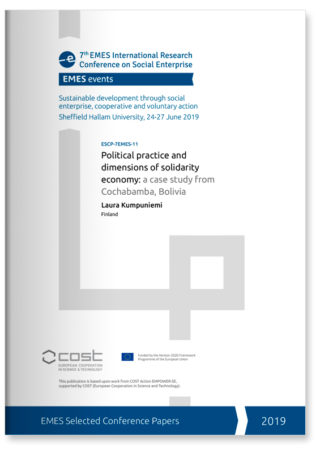Introduction
In this paper, I examine the political dimensions of solidarity economy and the example of a grassroots solidarity economy market, ECO Feria, in Cochabamba, Bolivia. I ask how actors practise their political dimensions as part of the solidarity economy movement. I analyse Ecoferia in relation to Gibson-Graham’s (2006) framework for community economy and post-capitalist politics and some views on politicisation in the solidarity economy movement. My research framework focuses on solidarity economy that is a concept used in many Latin American countries.
Carneiro (2011) writes about some political aspects of solidarity economy and, for example, Hillenkamp (2014) has approached also political processes of solidarity economy in Bolivia through case studies in El Alto. Solidarity economy literature, however, lacks some of the comprehensiveness about politicisation that Gibson-Graham (2006) offer in their writing about community economy. Miller (2013) juxtaposes community and solidarity economy by treating them both as suggestions for radically democratic economic organising and suggesting that solidarity economy is one possibility for practical implementation of the more abstract ideas of community economy. I have turned to the ideas of post-capitalist politics to shed light on and broaden the discussion on the politicised aspects of solidarity economy. I argue, in the lines of Carneiro (2011), that solidarity economy has a focus on repoliticising economy since one central characteristic of solidarity economy is the attention to both economic and political issues.
In Bolivia, solidarity economy has been gaining interest in the past 20 years. My case analysis is based on ethnographic fieldwork in Cochabamba, Bolivia, where I have spent in total eight months in three periods between 2016–2018. My data consists of interviews, events, observations, and notes on discussions as well as documents and photos. After transcribing hand-written notes and recorded interviews, I have analysed the materials thematically using atlas.ti. I have used both predetermined theory-based and data-based themes in my analysis, but this paper is mostly based on predetermined codes that cover the research participants’ motivating factors and values and different aspects of organising and activities in different levels of the society.
This paper presents the first results of my PhD research about solidarity economy activities and their impact on democratisation in Bolivia. With my research, I hope to offer new information about the political nature of solidarity economy in Bolivia by analysing different dimensions of politicisation through Gibson-Graham’s framework.
To read the full paper, please download the pdf




